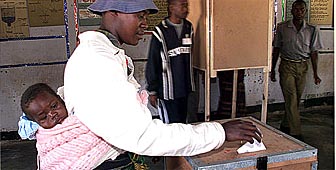
Swiss observers broadly satisfied with Zimbabwean elections

A group of Swiss observers has just returned from monitoring last weekend's elections in Zimbabwe.
The group of nine was sent to Zimbabwe by Swiss Interchurch Aid and the Bethlehem Mission to join forces with around 300 foreign observers trying to ensure free and fair elections.
In the months leading up to Zimbabwe’s poll more than 30 people were killed in election-related violence blamed mostly on supporters of the ruling party, Zanu-PF.
President Robert Mugabe encouraged a campaign against white farmers, many of whom found their land occupied by government supporters. Analysts say Mugabe used the controversial issue of land redistribution to rally his supporters in the face of the stiffest opposition for 20 years.
But despite these tactics, the opposition Movement for Democratic Change won 57 of the 120 parliamentary seats up for election.
The president’s party clung on to its majority, winning 62 constituencies. That figure will be boosted when Mugabe appoints a further 30 deputies.
But the result is a major reverse for Zanu-PF which held all but three seats in the outgoing parliament.
Like their European Union colleagues, the Swiss observers declared themselves broadly happy with the conduct of the election itself.
“I would say that even in Shona areas where Zanu-PF was way ahead from the beginning the conduct of the poll on a technical level was impressive”, says Doctor Hans Albonico from Berne. “I would say all officials were trying their best. But at the same time I must say that the effects of the intimidation campaign over the previous months was still to be seen.”
The irregularites ranged from small acts of intimidation to serious physical attacks.
“It could be minor things like Zanu-PF youth noting voters’ names,” says Doctor Albonico, “It could be more serious such as the Zanu candidate actually addressing people in polling areas in serious breach of electoral law. And it could be very serious such as the case of the 20 year old who came in and had been severely beaten just days before the election and had received no help from the police at the time.”
The observers said the mood among ordinary Zimbabweans as they went to vote was very tense. But they noticed an easing of that tension as polls closed and it appears that the election has acted as a kind of safety valve.
President Mugabe has promised to work with the new parliament and though it has announced its intention to contest the result in around 20 seats, the opposition too seems happy with the outcome.
But optimism that this vote will solve the country’s racial and social tensions is surely misplaced.
“The question of land redistribution is 100 years old and is by no means solved,” says Doctor Albonico. “Already on Monday, Mugabe made it clear that he would go on with the expropriation of farm lands.”
The overall impression given by the Swiss observers on their return is however one of hope.
Zimbabwe’s people braved months of intimidation and violence to vote and the turnout was the highest for 20 years.
The group said many ordinary people had spoken of their fear of a civil war in the days leading up to the poll.
That fear has for the moment at least receded.
by Michael Hollingdale

In compliance with the JTI standards
More: SWI swissinfo.ch certified by the Journalism Trust Initiative






























You can find an overview of ongoing debates with our journalists here . Please join us!
If you want to start a conversation about a topic raised in this article or want to report factual errors, email us at english@swissinfo.ch.